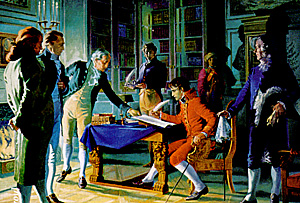
During the peace from 1801 to 1803, First Consul Bonaparte devoted his considerable focus and energy to domestic reforms in France.
One of the most debilitating problems that plagued the Directory was inflation; Napoleon sought to place France on sound financial footing. With the confidence and cooperation of the country's bankers, who prized stability and order, Napoleon established the National Bank of France in February 1800, just before he embarked on his second Italian campaign. By creating a stable currency and lower interest rates, and by moving away from paper money to hard currency (coins), Napoleon achieved improved economic stability.
Another failure of the Revolution was the inability to complete a unifying system of legal reforms. Napoleon chaired a committee that undertook this task, and he provided the vision of compromise that underlies the work, that of preserving the egalitarian reforms of the Revolution while ensuring the social and family stability of traditional Roman law (although it allowed for civil marriage and divorce). The Civil Code of 1804, known as the Code Napoleon, remains the legal foundation of many countries in the world. Napoleon considered it his finest achievement, greater than any of his military victories.
The creation of the Legion of Honor, in 1802, provided a means to reward and inspire achievement -- and bind the loyalty of such successful individuals to him (see photo). The enameled cross, suspended by a red ribbon, rapidly became one of the most coveted awards within the ranks of the Imperial army, from lowly private to marshal. By 1814, there were some 32,000 recipients, of which 1,500 were civilians. The award endures to the present day (p.12).
In education, Napoleon created the lycee system, which, in modern terms, were elite secondary schools for talented students, most of whom would have their education paid for by the state. Napoleon also established twelve new law schools. Nationally, he created a centralized university system, by which quality education became a state focus.
Napoleon characteristically believed in strengthening the infrastructure of France and spent a great deal of money on civil projects such as building canals and improving roads. He equipped Paris' first professional fire brigade, created a national department of forestry, and ordered the planting of trees along all of France's roads.
To help end the civil strife that had been a national tragedy in the Vendee and other regions, Napoleon initiated the Concordat of 1801. This was a political deal with Pope Pius VII which restored the Catholic Church in France without sacrificing state control of the clergy or restoring any of the confiscated church lands (nor was religious freedom diminished).
In the 28 months of peace between the treaty of Luneville (9 February 1801) and Britain's declaration of war on 16 May 1803, Napoleon completed an impressive record of civil achievement and reform. Most of these have endured and stand as Napoleon's most enduring legacy.
More Napoleon: Introductory Guide
-
Introduction
Prejudice and Pride
Napoleon in Military School
The Young Artillerist's Double Life
Revolution & Opportunity
Women's Fashion During the Revolution
The Siege of Toulon
Napoleon & Josephine
Women's Fashion during the Directory
Fame & Glory: Italy
Fame & Glory: Egypt
Saviour or Usurper
Battle of Marengo
Civil Achievments
Enlightened Despot or Tyrant
Napoleon's Siblings
The Dawn of Gastronomy
Haydn and Beethoven
Women's Fashion during the Empire
Napoleon's Other Women
The Mashalate and Imperial Eagle
History's Greatest General?
Back to Table of Contents -- Napoleon #17
Back to Napoleon List of Issues
Back to MagWeb Master Magazine List
© Copyright 2001 by Napoleon LLC.
This article appears in MagWeb (Magazine Web) on the Internet World Wide Web.
The full text and graphics from other military history magazines and gaming magazines are available at http://www.magweb.com
Order Napoleon magazine direct